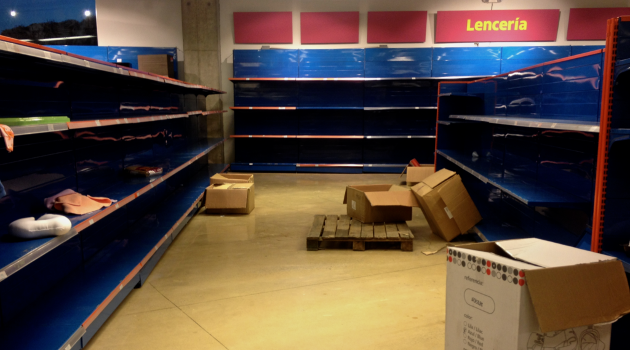According to a “Happy Planet” index put together by some leftists a few years ago, Venezuela is supposed to be one of the world’s best nations.
But I strongly suspect that the vast majority of these people would be horrified if they actually had to live there.
That’s because Venezuela is proving that Margaret Thatcher was right when she said socialists eventually run out of other people’s money.
But what’s really killing the country, above and beyond the government being out of money, is pervasive statism. There are so many forms of regulation and intervention that the private sector, for all intents and purposes, has gone on strike. Venezuela is like a real-world example of Ayn Rand’s famous novel, Atlas Shrugged.
I was writing about the Venezuelan disaster six years ago, but it’s even gotten to the point that left-leaning establishment media outlets are finally recognizing the handwriting on the wall.
The Economist has a very gloomy assessment.
…around 120 people are queuing for food at government-controlled prices from a state-run supermarket. The food queue starts at 3am. “Sometimes there’s food and sometimes there isn’t,” one would-be shopper says. In this district of Caracas, once a Chávez stronghold, his aura is fading amid the struggle for daily survival. …his “Bolivarian revolution”, a mishmash of indiscriminate subsidies, price and exchange controls, social programmes, expropriations and grand larceny by officials…has exposed the revolution as a monumental swindle.
Needless to say, the government elite still enjoy very comfortable lives.
But for average people, statism has created untold misery.
Real wages fell by 35% last year… According to a survey by a group of universities, 76% of Venezuelans are now poor, up from 55% in 1998. …Many pills are unavailable; patients die as a result. In Caracas food queues at government stores grow longer by the week. …Violent crime is out of control. …Violent scuffles in food queues and localised looting are everyday occurrences.
Sounds like fun, huh? Maybe it’s Atlas Shrugged mixed with Lord of the Flies.
In any event, it’s gotten so bad that even the Washington Post has taken notice. Here are some excerpts from that paper’s story.
…the country of 30 million people is facing an economic collapse and a humanitarian disaster. Venezuela already suffers from the world’s highest inflation rate — expected to rise from 275 percent to 720 percent this year — one of its higher murder rates and pervasive shortages of consumer goods, ranging from car parts to toilet paper. Power outages and the lack of raw materials are forcing surviving factories and shops to close or limit opening hours. …the U.S. dollar is worth 150 times more on the black market than it is at the official rate.
Wait, did the Washington Post acknowledge that Venezuela has a very high murder rate? But how can that be when there are strong gun control laws, just like the Post wants to impose on America?
I’m being sarcastic, of course, because I couldn’t resist a momentary digression. Let’s get back to Venezuela’s economic mess.
Here are some examples of what it’s like to be an imploding statist economy. The U.K.-based Times reports on the surreal details.
Shopping centres across Venezuela have cut their trading time by four hours a day because of electricity rationing ordered by the Socialist government. President Maduro has suggested that people grow their own food to survive a possible economic collapse, after revealing last month that he and his wife kept 50 chickens at home. …Inflation is estimated at more than 700 per cent, there are endless queues outside shops, and crime rates have soared — leading some analysts to report that Venezuela’s economy is in a “death spiral”. …the state-subsidised supermarkets, where thousands of people line up to get their meagre ration of basic supplies every day, and fights are common. …The nation’s health services are breaking down.
At the risk of (further) outing myself as a typical libertarian, a core premise of Atlas Shrugged was the economy entering a death spiral because the political class kept figuring out new ways to expand the size and scope government.
So I guess it’s nice that Venezuela is giving us a real-world example of what happens when government places too many straws on the camel’s back.
Last but not least, here’s some of what the New York Times has reported.
In the capital, water is so expensive and scarce that residents wait for hours with bottles at the side of a mountain where it trickles out onto the highway. In the countryside, sugar cane fields rot, and milk factories stand idle, even as people carry bags of money around to buy food on the black market in every city and town. …And it is all about to get much worse. …Ransoms are a business across this country.
The entire story is filled with heartbreaking stories of suffering families and maddening anecdotes about how unconstrained government has wrecked a potentially rich nation.
Which gives me a good reason to make the most important point of this article.
All the bad policies in Venezuela were imposed because politicians supposedly “cared” about ordinary people. That was the rationale for higher welfare payments, minimum wages, price controls, subsidies, and all sorts of other “compassionate” policies.
Yet the news reports above show that it’s regular people who are now suffering the most because excessive government is causing an economic collapse.
Which is why this chart comparing Venezuela, Argentina, and Chile is so powerful. Ordinary people did the best in the nation with a government that did the least.
———
Image credit: ZiaLater | CC BY-SA 3.0.

